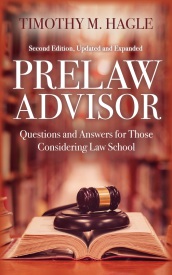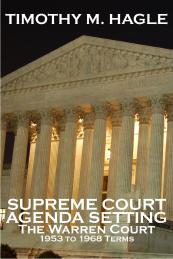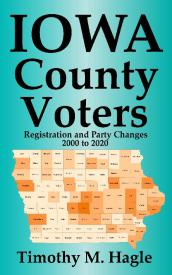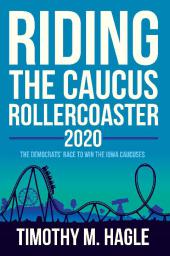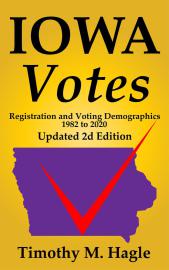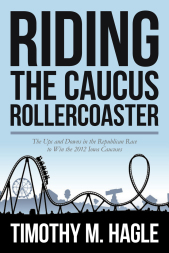
Contact Info
347 Schaeffer Hall
319-335-2348
timothy-hagle@uiowa.edu
Twitter: @ProfHagle
Fall 2024 Office Hours
Tue & Th: 4:45-6:15
Mailing Address
Dept of Political Science
341 Schaeffer Hall
20 E. Washington Street
The University of Iowa
Iowa City, Iowa 52242
News
Posted updated Prelaw FAQ for UI students
New Book, Riding the Caucus Rollercoaster 2024, published in paperback and for Kindle devices.
Posted updates to 12 papers in Iowa Voting Series for 2022 election data
New Book, Supreme Court Agenda Setting: The Warren Court, published for Kindle devices and computers with Kindle reader.
Published updated and expanded edition of Prelaw Advisor in paperback and for Kindle readers
My books
POLI:31113 Research in Judicial Politics
New Questionnaire Responses
This page contains the responses to the new questionnaire that I used for courses taught from the Fall 2015 semester on.
Prior to the Fall 2015 semester I had used my own questions for my teaching evaluations. I did this because I didn't think the standard questions on either the old SPOT or ACE forms got at things I wanted to know regarding the students' thoughts on the course. I also objected to the way the questions were structured. By that I mean that all the questions were phrased in positive terms and were on a six-point strongly agree to strongly disagree scale. Well-constructed surveys don't structure the questions in that way. In part, this is so that the person responding to the survey doesn't just automatically pick agree or disagree for everything, but must read and think about each question.
The process for administering teaching evaluations was moved online beginning with the Fall 2015 semester. Unfortunately, this meant that all instructors were forced to use a set of standard questions. Although instructors could add questions of their own, there were significant limitations in the form and format of such questions. As a result, the new questionnaire for my courses included three standard questions asked of all College of Liberal Arts and Sciences courses, 11 questions required by the Political Science Department, and seven of my own questions. The response set for all these questions ranged from 6 = strongly agree, to 1 = strongly disagree.
Some of the Department questions were similar to those I had used on my old questionnaire. That allowed me to limit my added questions to only 10 while still covering most of the items contained on my previous questionnaire.
A Note on This Course: As the title of the course suggests, this is a research course. That makes it quite different from my other courses. The first several weeks of the semester are training to work on the database project that is the focus of the course. The students then get their assignments and the next few weeks are spent refining their ability to gather the required information and code it for the database. The last several weeks of the course effectively become an independent study in that the students mainly continue to work on their assignments with less direction from me. This course is also different from my others in that students must have had one of my other judicial courses before this one (though I sometimes make exceptions).
Reminder: The response set for all the questions below is 6 = strongly agree to 1 = strongly disagree.
N is the number of students who submitted the evaluation. The number in the (6) to (1) columns indicates how many students selected that option. The Mean is the mean score for that semester. The Dept Mean is the mean score for all instructors for that question across all courses.
CLAS Core Questions
These three questions are asked of all courses offered in the College of Liberal Arts and Sciences. Given the variety of subject matter and course structures they have to be pretty vague. That makes me wonder a bit about their usefulness.
The instructor was effective in teaching the course materials.
| Semester |
N |
(6) | (5) | (4) | (3) | (2) | (1) | Mean | Dept Mean |
| S 2016 | 6 | 5 | 1 | 0 | 0 | 0 | 0 | 5.83 | 5.05 |
| S 2017 | 1 | 1 | 0 | 0 | 0 | 0 | 0 | 6.00 | 5.05 |
| S 2018 | 6 | 5 | 1 | 0 | 0 | 0 | 0 | 5.83 | 5.04 |
| S 2019 | 7 | 6.00 | 5.14 | ||||||
| S 2020 | 1 | 6.00 | 4.96 |
I'm not sure how the student is to interpret "effective" here. In my Instructor Questions I as whether the student learned a lot in the course, but even with that wording it's still a matter of how much effort the student puts intot the course.
Spring 2020: This was the semester when courses had to go online after Spring Break. That didn't affect this course more than my other one, but it did seem to depress the response rate for the evaluations. Even though I made a video for the students talking about the course and encouraging them to do the evaluations, only one did so. Like when this happened in 2017, I suppose it's good that the one evaluator liked the course. ;)
Spring 2019: The report I get on the course evalutions apparently no longer includes the number of individual responses for each question, just the course and department means. I'm not sure why they are no longer included, but it is what it is. There were 9 students officially in this course, but another three who were taking it as an Honors course, but they don't get to do regular course evals.
Spring 2018: Two things are worth mentioning for this semester. The first is that I had a mild heart attack a few weeks in followed by heart surgery. That put me out of commission for a couple of weeks. I had to give up my other spring course but kept this one as I was able to have the students work independently and communicate with them via email until I could get back in class. The second thing is that I sent the class three messages about doing the evaluations (in addition to talking to them in class about them), but still managed only six of the 11 doing them.
Spring 2017: Only one person responded out of about a dozen in the class? Geez! I had one other student send me some comments who said she didn't do the questionnaire, but one respondent is still pretty surprising. It's also disappointing in that the numbers for this course are usually pretty good. The student who responded gave pretty high scores, and I appreciate that, but it would have been better for more to have responded. I'll note here that with the old version of the questionnaire I gave in class I usually got 100% participation. Online participation in this and other classes seems to be getting lower.
Spring 2016: Because of a bureaucratic mixup I actually taught this course as POLI:3150, but it was the same course. There were 12 in the class, but only six filled out the evaluations. I usually had near 100% participation when I did these in class. Given the nature of this course I thought they would still have higher participation now that the evaluations have gone online, but apparently not.
The work assigned by the instructor was worthwhile and helped me learn the course material.
| Semester |
N |
(6) | (5) | (4) | (3) | (2) | (1) | Mean | Dept Mean |
| S 2016 | 6 | 6 | 0 | 0 | 0 | 0 | 0 | 6.00 | 4.90 |
| S 2017 | 1 | 1 | 0 | 0 | 0 | 0 | 0 | 6.00 | 4.88 |
| S 2018 | 6 | 5 | 1 | 0 | 0 | 0 | 0 | 5.83 | 4.91 |
| S 2019 | 7 | 6.00 | 5.02 | ||||||
| S 2020 | 1 | 6.00 | 4.82 |
The "work assigned" for this course initially consists of reading the training manual several times. After a few weeks students get their assignments and the rest of the course is about gathering information and coding it for a set of cases.
The instructor supported student learning in this class.
| Semester |
N |
(6) | (5) | (4) | (3) | (2) | (1) | Mean | Dept Mean |
| S 2016 | 6 | 5 | 1 | 0 | 0 | 0 | 0 | 5.83 | 5.16 |
| S 2017 | 1 | 1 | 0 | 0 | 0 | 0 | 0 | 6.00 | 5.24 |
| S 2018 | 5 | 1 | 0 | 0 | 0 | 0 | 0 | 5.83 | 5.22 |
| S 2019 | 7 | 6.00 | 5.27 | ||||||
| S 2020 | 1 | 6.00 | 5.18 |
Again, I know these questions have to be vague, but "supported" doesn't seem very clear to me. Still for this course my answering questions is a big part of the support I give them. Aside from in class, they were likely to email me questions when they were at the law library working on cases and I was usually able to respond fairly quickly.
Political Science Department Questions
Class time is used efficiently.
| Semester |
N |
(6) | (5) | (4) | (3) | (2) | (1) | Mean | Dept Mean |
| S 2016 | 6 | 6 | 0 | 0 | 0 | 0 | 0 | 6.00 | 5.09 |
| S 2017 | 1 | 1 | 0 | 0 | 0 | 0 | 0 | 6.00 | 5.06 |
| S 2018 | 6 | 5 | 1 | 0 | 0 | 0 | 0 | 5.83 | 5.03 |
| S 2019 | 7 | 5.71 | 5.17 | ||||||
| S 2020 | 1 | 6.00 | 5.00 |
Spring 2016: It's not a mistake, for this and all but a couple of the remaining questions all six of the students who did the evaluations marked 6 = strongly agree. I usually get good evaluations for this course, but this group seemed particularly receptive to what we were doing in class.
Course requirements are clear.
| Semester |
N |
(6) | (5) | (4) | (3) | (2) | (1) | Mean | Dept Mean |
| S 2016 | 6 | 6 | 0 | 0 | 0 | 0 | 0 | 6.00 | 5.24 |
| S 2017 | 1 | 1 | 0 | 0 | 0 | 0 | 0 | 6.00 | 5.20 |
| S 2018 | 6 | 4 | 2 | 0 | 0 | 0 | 0 | 5.67 | 5.17 |
| S 2019 | 7 | 5.86 | 5.16 | ||||||
| S 2020 | 1 | 6.00 | 4.94 |
Concepts are presented in a manner that helps me learn.
| Semester |
N |
(6) | (5) | (4) | (3) | (2) | (1) | Mean | Dept Mean |
| S 2016 | 6 | 6 | 0 | 0 | 0 | 0 | 0 | 6.00 | 4.93 |
| S 2017 | 1 | 0 | 1 | 0 | 0 | 0 | 0 | 5.00 | 4.96 |
| S 2018 | 6 | 3 | 2 | 1 | 0 | 0 | 0 | 5.33 | 4.91 |
| S 2019 | 7 | 6.00 | 4.99 | ||||||
| S 2020 | 1 | 6.00 | 4.80 |
Adequate time for questions was provided.
| Semester |
N |
(6) | (5) | (4) | (3) | (2) | (1) | Mean | Dept Mean |
| S 2016 | 6 | 6 | 0 | 0 | 0 | 0 | 0 | 6.00 | 5.10 |
| S 2017 | 1 | 1 | 0 | 0 | 0 | 0 | 0 | 6.00 | 5.13 |
| S 2018 | 6 | 6 | 0 | 0 | 0 | 0 | 0 | 6.00 | 5.16 |
| S 2019 | 7 | 5.86 | 5.18 | ||||||
| S 2020 | 1 | 6.00 | 5.11 |
Spring 2019: Arrrgggh! Someone broke my streak on this question! It's actually a little odd given that so much of the class time is devoted to my fielding questions from the students, not to mention questions they can ask outside of class via email or during office hours.
This instructor communicates at a level appropriate to my understanding.
| Semester |
N |
(6) | (5) | (4) | (3) | (2) | (1) | Mean | Dept Mean |
| S 2016 | 6 | 6 | 0 | 0 | 0 | 0 | 0 | 6.00 | 5.16 |
| S 2017 | 1 | 0 | 1 | 0 | 0 | 0 | 0 | 5.00 | 5.13 |
| S 2018 | 6 | 6 | 0 | 0 | 0 | 0 | 0 | 6.00 | 5.13 |
| S 2019 | 7 | 5.71 | 5.16 | ||||||
| S 2020 | 1 | 6.00 | 5.14 |
Help is available outside class if I have questions.
| Semester |
N |
(6) | (5) | (4) | (3) | (2) | (1) | Mean | Dept Mean |
| S 2016 | 6 | 6 | 0 | 0 | 0 | 0 | 0 | 6.00 | 5.33 |
| S 2017 | 1 | 1 | 0 | 0 | 0 | 0 | 0 | 6.00 | 5.32 |
| S 2018 | 6 | 5 | 1 | 0 | 0 | 0 | 0 | 5.83 | 5.28 |
| S 2019 | 7 | 6.00 | 5.36 | ||||||
| S 2020 | 1 | 6.00 | 5.25 |
These days it seems I'm never far from a computer or my smart phone, so I'm able to respond to student's questions via email pretty much any time. I haven't had a TA for this course for some time, however, so that might affect students' responses to this question.
This instructor's oral communication skills are adequate for the course.
| Semester |
N |
(6) | (5) | (4) | (3) | (2) | (1) | Mean | Dept Mean |
| S 2016 | 6 | 6 | 0 | 0 | 0 | 0 | 0 | 6.00 | 5.28 |
| S 2017 | 1 | 1 | 0 | 0 | 0 | 0 | 0 | 6.00 | 5.20 |
| S 2018 | 6 | 6 | 0 | 0 | 0 | 0 | 0 | 6.00 | 5.18 |
| S 2019 | 7 | 6.00 | 5.24 | ||||||
| S 2020 | 1 | 6.00 | 5.10 |
Students in my lecture courses sometimes complain a bit that I speak too fast. This shouldn't be a problem in this course given that the material I am explaining is in their training manual.
Assignments and exams allow me to adequately demonstrate what I have learned.
| Semester |
N |
(6) | (5) | (4) | (3) | (2) | (1) | Mean | Dept Mean |
| S 2016 | 6 | 6 | 0 | 0 | 0 | 0 | 0 | 6.00 | 4.97 |
| S 2017 | 1 | 1 | 0 | 0 | 0 | 0 | 0 | 6.00 | 4.95 |
| S 2018 | 6 | 6 | 0 | 0 | 0 | 0 | 0 | 6.00 | 4.95 |
| S 2019 | 7 | 6.00 | 5.01 | ||||||
| S 2020 | 1 | 6.00 | 4.82 |
This instructor encourages mutual respect among students of diverse backgrounds.
| Semester |
N |
(6) | (5) | (4) | (3) | (2) | (1) | Mean | Dept Mean |
| S 2016 | 6 | 5 | 1 | 0 | 0 | 0 | 0 | 5.83 | 5.80 |
| S 2017 | 1 | 1 | 0 | 0 | 0 | 0 | 0 | 6.00 | 5.47 |
| S 2018 | 6 | 6 | 0 | 0 | 0 | 0 | 0 | 6.00 | 5.49 |
| S 2019 | 7 | 6.00 | 5.52 | ||||||
| S 2020 | 1 | 6.00 | 5.53 |
The content of this course is valuable.
| Semester |
N |
(6) | (5) | (4) | (3) | (2) | (1) | Mean | Dept Mean |
| S 2016 | 6 | 6 | 0 | 0 | 0 | 0 | 0 | 6.00 | 5.80 |
| S 2017 | 1 | 0 | 0 | 1 | 0 | 0 | 0 | 4.00 | 5.22 |
| S 2018 | 6 | 4 | 2 | 0 | 0 | 0 | 0 | 5.67 | 5.20 |
| S 2019 | 7 | 6.00 | 5.25 | ||||||
| S 2020 | 1 | 6.00 | 5.21 |
I would recommend a course taught by this instructor to other students.
| Semester |
N |
(6) | (5) | (4) | (3) | (2) | (1) | Mean | Dept Mean |
| S 2016 | 6 | 6 | 0 | 0 | 0 | 0 | 0 | 6.00 | 5.03 |
| S 2017 | 1 | 1 | 0 | 0 | 0 | 0 | 0 | 6.00 | 4.97 |
| S 2018 | 6 | 6 | 0 | 0 | 0 | 0 | 0 | 6.00 | 4.97 |
| S 2019 | 7 | 6.00 | 5.02 | ||||||
| S 2020 | 1 | 6.00 | 4.81 |
Instructor Questions
The next seven questions are ones only I ask so there isn't a Department Mean for them.
I attended every class period.
| Semester |
N |
(6) | (5) | (4) | (3) | (2) | (1) | Mean |
| S 2016 | 6 | 2 | 4 | 0 | 0 | 0 | 0 | 5.33 |
| S 2017 | 1 | 0 | 1 | 0 | 0 | 0 | 0 | 5.00 |
| S 2018 | 6 | 5 | 0 | 0 | 1 | 0 | 0 | 5.50 |
| S 2019 | 7 | 5.83 | ||||||
| S 2020 | 1 | 6.00 |
This question relates to my old question 1. The hope here was that the student disagreed more the more classes he or she missed. Coming to class is obviously a good thing. Beyond that, attendance is pretty much required for the first several week until everyone has a handle on the specfics of the project.
I was always well prepared for class (did the readings, etc.).
| Semester |
N |
(6) | (5) | (4) | (3) | (2) | (1) | Mean |
| S 2016 | 6 | 6 | 0 | 0 | 0 | 0 | 0 | 6.00 |
| S 2017 | 1 | 0 | 1 | 0 | 0 | 0 | 0 | 5.00 |
| S 2018 | 6 | 3 | 2 | 1 | 0 | 0 | 0 | 5.33 |
| S 2019 | 7 | 5.83 | ||||||
| S 2020 | 1 | 6.00 |
This question relates to my old question 2. This course has an extensive set of readings that must be done at the start of the semester. After that it's more a matter of keeping up on the assignments.
I was very interested in learning the course material.
| Semester |
N |
(6) | (5) | (4) | (3) | (2) | (1) | Mean |
| S 2016 | 6 | 6 | 0 | 0 | 0 | 0 | 0 | 6.00 |
| S 2017 | 1 | 1 | 0 | 0 | 0 | 0 | 0 | 6.00 |
| S 2018 | 6 | 5 | 1 | 0 | 0 | 0 | 0 | 5.83 |
| S 2019 | 7 | 5.83 | ||||||
| S 2020 | 1 | 6.00 |
This question relates to my old question 9. Normally, all of the students who take this class are either planning on or thinking about attending law school. As such they are usually very interested in the material.
I learned a lot in this course.
| Semester |
N |
(6) | (5) | (4) | (3) | (2) | (1) | Mean |
| S 2016 | 6 | 6 | 0 | 0 | 0 | 0 | 0 | 6.00 |
| S 2017 | 1 | 1 | 0 | 0 | 0 | 0 | 0 | 6.00 |
| S 2018 | 6 | 6 | 0 | 0 | 0 | 0 | 0 | 6.00 |
| S 2019 | 7 | 5.67 | ||||||
| S 2020 | 1 | 6.00 |
This question relates to my old question 10. Working on the research project gives students a chance to read cases and learn about the courts. Even though the scores are good here, comments I've gotten from students once they've begun law school suggest that they didn't fully realize the importance of what they were learning until they had their first research assignment and they knew what to do while many of their classmates were lost.
I was challenged by this course.
| Semester |
N |
(6) | (5) | (4) | (3) | (2) | (1) | Mean |
| S 2016 | 6 | 6 | 0 | 0 | 0 | 0 | 0 | 6.00 |
| S 2017 | 1 | 1 | 0 | 0 | 0 | 0 | 0 | 6.00 |
| S 2018 | 6 | 3 | 2 | 1 | 0 | 0 | 0 | 5.33 |
| S 2019 | 7 | 6.00 | ||||||
| S 2020 | 1 | 6.00 |
This question relates to my old question 12. Students can get through this course without trying to challenge themselves. This often shows in their work. Some students initially see the course as just coding a bunch of numbers. Most eventually see the understanding and work required to really do a good job.
The amount of material covered in the course was appropriate.
| Semester |
N |
(6) | (5) | (4) | (3) | (2) | (1) | Mean |
| S 2016 | 6 | 6 | 0 | 0 | 0 | 0 | 0 | 6.00 |
| S 2017 | 1 | 1 | 0 | 0 | 0 | 0 | 0 | 6.00 |
| S 2018 | 6 | 4 | 2 | 0 | 0 | 0 | 0 | 5.67 |
| S 2019 | 7 | 5.67 | ||||||
| S 2020 | 1 | 6.00 |
This question relates to my old question 13. All the initial material for this course can be daunting at first, but by the end of the course most students feel they have a good handle on the material.
The instructor answered questions in class very well.
| Semester |
N |
(6) | (5) | (4) | (3) | (2) | (1) | Mean |
| S 2016 | 6 | 6 | 0 | 0 | 0 | 0 | 0 | 6.00 |
| S 2017 | 1 | 1 | 0 | 0 | 0 | 0 | 0 | 6.00 |
| S 2018 | 6 | 6 | 0 | 0 | 0 | 0 | 0 | 6.00 |
| S 2019 | 7 | 6.00 | ||||||
| S 2020 | 1 | 6.00 |
This question relates to my old question 7. I probably shouldn't have used "very well" here and used the more bland "appropriate." Still, it seems my score was pretty good. These scores are usually higher than for POLI:3101, but about the same as for POLI:3120. Students in this course learn how to do judicial research by working on an ongoing project of mine. I use the questions they ask about the project to work in a fair amount of additional material on the courts and the judicial system. I think every student in the course plans on attending law school, so they tend to appreciate the additional information.
